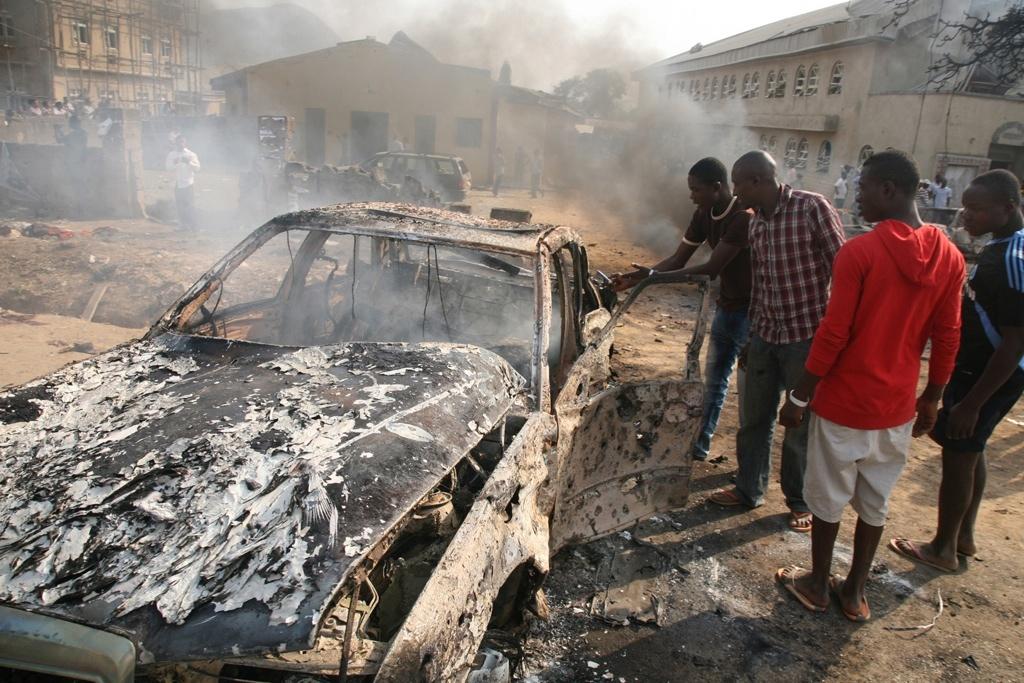Nigeria reels from extremist violence
Nigerians look at the wreckage of a car following a bomb blast at St Theresa Catholic Church outside the Nigerian capital Abuja on December 25, 2011. Two explosions near churches during Christmas Day services in Nigeria, including one outside the country’s capital, killed at least 28 people amid spiralling violence blamed on an Islamist extremist group, Boko Haram.
ABUJA, Nigeria — Nigeria’s increasingly deadly Islamist sect, Boko Haram, has followed up its attacks on Christians on Christmas Day with a wave of further religious violence, heightening fears that Africa’s most populous nation could slip into a wider sectarian conflict.
Hundreds of Nigerians are fleeing areas of north-east Nigeria to escape further attacks, according to local reports.
Boko Haram, which wants Shariah law more widely applied in Nigeria, has upped its campaign of violence in recent days, despite President Goodluck Jonathan declaring a state of emergency in several northern states on Dec. 31, leading to increased military presence there.
On Jan. 3, Boko Haram ordered Christians to leave northern Nigeria within three-days in a statement published by local press.
Since the deadline passed there has been a wave of attacks.
Gunmen opened fire on a church service in Nasarawa, Gombe state in northern Nigeria on Jan. 5, killing six people and injuring 10.
Then on Jan. 6, armed men shot and killed a total of 17 people in Mubi, Adamawa state, south of Boko Haram’s home state of Borno, after storming a town hall where a group of Christians were meeting, mourning the death of a friend killed the previous evening.
Nigeria’s population of 160 million is split roughly equally between Muslims and Christians, although there are hundreds of different ethnic groups and around 250 languages spoken. The Christians mostly live in the South and Muslims in the North. Most live relatively peacefully side-by-side.
Nigeria had already experienced its second Christmas of deadly violence when Boko Haram unleashed a spate of co-ordinated attacks across the country claiming over 40 lives and injuring dozens more. The sect claimed responsibility for several lethal attacks, three targeting churches heaving with worshippers for Christmas services.
The relentless attack on Christians has sparked fears of reprisals and a wider sectarian conflict.
“There is a limit to which you can push people. Christians have been pushed to the wall in this country,” said the Christian Association of Nigeria. “The Christian community in Nigeria will have no other option than to do whatever it deems necessary in every possible way to defend herself.”
Boko Haram, which roughly translates as “Western education is forbidden,” is demanding the wider application of Shariah law in Nigeria. The low level insurgency used to be largely confined to northeastern Nigeria but has been growing in ambition and capability. More than 500 people have been killed by the group over the past year.
The West is growing concerned about the sect’s increasing sophistication.
Boko Haram was named as an “emerging threat” to the U.S and its interests in a December report by a subcommittee of the US House Committee on Homeland Security which said the fast evolution of the group was worrying. The U.S has begun training Nigerian troops in counter-terrorism techniques, while France and Britain are offering military support and intelligence sharing.
Boko Haram’s homeland state, Borno, borders Niger, where Al Qaeda of the Islamic Maghreb (AQIM) operates. Boko Haram’s tactics and targets are increasingly emulating those of other Al Qaeda affiliates.
U.S. intelligence has concluded that Boko Haram members have trained in other countries as far east as Somalia, linking with the Islamist extremists Al Shabaab.
Boko Haram has maintained its campaign of violence for over a year, gaining the confidence and expertise to hit high-profile targets. The Christmas day bombings are the biggest attacks since a suicide bombing of the United Nation’s headquarters in Abuja in August killed 25 people.
Boko Haram continues to remain illusive and ill defined. Analysts believe the sect has several factions, some of which are criminal gangs acting under the auspices of Boko Haram.
Pervasive poverty coupled with mass unemployment in the mostly Muslim north, has created a conducive atmosphere allowing Boko Haram to grow.
“The inequality of wealth in Nigeria between north and south has allowed Boko Haram to get support from unemployed youths sitting idly. Boko Haram provides food on the table and gives a sense of belonging,” said Shehu Sani, who leads the Civil Rights Congress of Nigeria and who brokered failed peace talks between Boko Haram and former president Obasanjo in September.
Nigerians in northern Nigeria are finding themselves caught by the bellicose actions of the military and police, which are taking harsh measures to crack down on Boko Haram. Northern Nigerians feel they have become trapped in a sea of violence.
“Collective punishment has made people hate the military,” said Sani. “People are caught between the militants and the military.”
